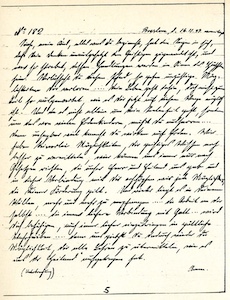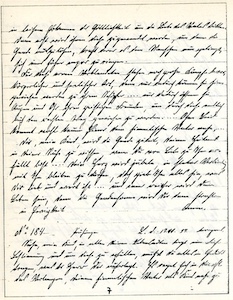The human being's resolve determines his actions and thoughts. He can certainly be opposed by another person's will and he can be prevented from implementing his own will, but then two equal forces will be fighting each other and the stronger resolve will be victorious; but this does not deny freedom of will. So therefore the human being himself inhibits his fellow human being, and this is in accordance with God's will as soon as the human will prevents his fellow human being from implementing heartless actions. In that case a strong will is a blessing for a fellow human being. Vice versa, however, it is very wrong to misuse a strong will by preventing a fellow human being from carrying out kind-hearted activities and spiritual striving and curtailing his own resolve. Such a battle against each other is based on heartlessness and can never be in accordance with God's will. The motive impelling a person's will into action is therefore always the decisive factor. The will remains free even if it is prevented from being implemented, this is why the will is judged and not always the deed.... if a person's will had no intention to accomplish a deed but was forced by his fellow human being into doing so. No human being on Earth should elevate himself for the sake of dominating his fellow human being, for this contradicts the right relationship between people in the eyes of God. Even those with great earthly power at their disposal should treat their subordinates like brothers; they should use their will by using their ruling power with love, by only ever striving towards that which is good and thus also trying to persuade their fellow human beings to make correct use of their will, that is, to only do deeds which are pleasing to God. But as soon as a ruling power forces people into carrying out deeds which contradict the commandment of love, it also binds their will, i.e. it makes it impossible for them to use their free will and thus it must also bear the responsibility for all forcibly undertaken deeds. Hence, free will, in an earthly respect, is not curtailed by God, instead, only people disable each other's freedom of will. Yet a violation of will is only possible in an earthly way. In a spiritual respect no power on earth is able to influence freedom of will. No power on earth can force the human will into a specific attitude towards God, no power on earth can prevent its inclination towards God but neither can any power incline it towards Him if it is still in opposition to Him. The human being must use his own will to form his opinion of God and what he decides to do is entirely up to him. The will's apparent lack of freedom in an earthly respect can occasionally have a favourable effect on his opinion about God, for where he considers his freedom to be inhibited a person often looks for a spiritual balance.... He activates his free will where it cannot be prevented, and thus an external coercion can still be of benefit to him, since the actual purpose of life merely consists of the decision of will for or against God which, however, will never exclude the fact that it is wrong to use the strength of will between people to inhibit another person's will. Were the commandments of love observed, every person would want that which would benefit his fellow human being and all intentions of dominating another person would be eliminated. Unkindness, however, impels people into taking ever more severe measures against each other.... The strong person will always use his will and override the will of the weak which, in a manner of speaking, is the influence of the power that once misused its free will for the apostasy from God....
Amen











